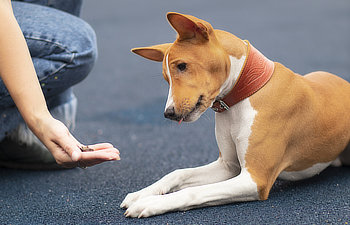
- Mental Stimulation: Engage your dog in mentally stimulating activities. Regularly provide puzzle toys, interactive games, and training sessions to keep their mind active. Mental stimulation helps prevent boredom, promotes problem-solving skills, and supports brain health.
- Enriched Environment: Create an enriched environment for your dog. Offer a variety of toys, including ones that encourage foraging and interactive play. Rotate toys to keep them interesting and introduce new experiences to stimulate your dog’s senses.
- Training and Tricks: Teach your dog new commands, tricks, or tasks. Training sessions not only strengthen the bond between you and your dog but also provide mental exercise. Learning new behaviors challenges the brain and keeps it sharp.
- Scent Work: Engage your dog in scent-based activities. Hide treats or toys for your dog to find using their sense of smell. You can also try nose work or scent detection games, which provide mental stimulation and tap into their natural instincts.
- Socialization: Provide opportunities for your dog to interact with other dogs and people in a safe and controlled manner. Socialization exercises the brain, exposes your dog to new experiences, and helps maintain cognitive function.
- Regular Exercise: Physical exercise is beneficial for both the body and the brain. It helps increase blood flow to the brain, reduces stress, and promotes overall well-being. Ensure your dog gets regular exercise appropriate for their age, breed, and health condition.
- Healthy Diet: Feed your dog a balanced and nutritious diet that supports brain health. Include foods rich in antioxidants, omega-3 fatty acids, and vitamins. Consult with your veterinarian to determine the best diet for your dog’s specific needs.
- Environmental Enrichment: Provide a stimulating environment for your dog. Allow them to explore new places, smells, and sounds. Take them on different walking routes, visit new parks, or set up a safe and supervised outdoor play area.
- Quality Sleep: Ensure your dog gets sufficient quality sleep. Sleep is essential for brain health and cognitive function. Provide a comfortable and quiet sleeping area for your dog to rest undisturbed.
- Regular Veterinary Check-ups: Schedule regular veterinary check-ups to monitor your dog’s overall health, including their cognitive function. Your veterinarian can provide guidance and identify any signs of cognitive decline or neurological issues.
Remember, each dog is unique, so it’s important to consider their individual needs, age, and health condition when implementing brain health activities. Tailor the activities to suit your dog’s capabilities and always prioritize their safety and well-being.
Posted on behalf of






